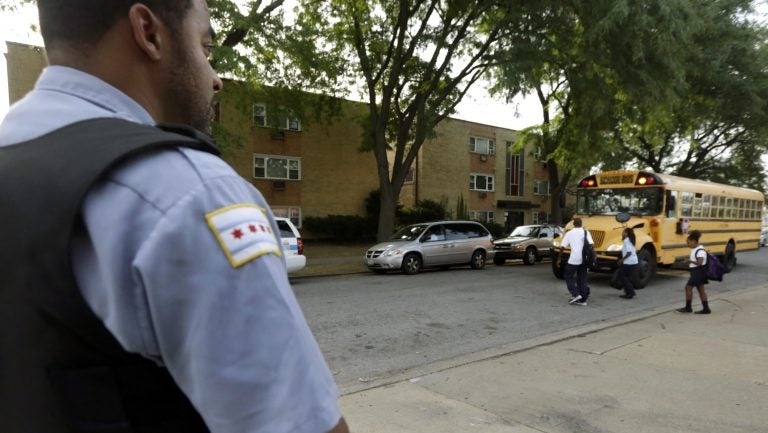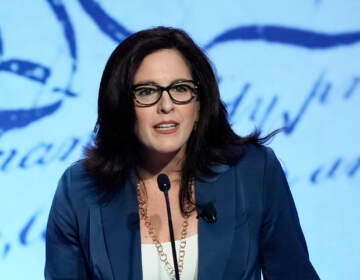Pa. educators decry Trump’s proposed school security cuts
"National approaches to school safety" are on the agenda Thursday as the Pennsylvania House Education Committee meets in Harrisburg for a hearing on school safety measures.

(M. Spencer Green/AP)
“National approaches to school safety” are on the agenda Thursday as the Pennsylvania House Education Committee meets in Harrisburg for a hearing on school safety measures.
After the Parkland, Florida, school shootings last month, President Donald Trump has proposed training teachers and other school staff to carry guns. But his proposed budget would cut funding for school safety measures by more than a third.
The 36 percent decrease in school safety programs would eliminate some federal grants to schools — such as the Philadelphia school district’s multiyear School Climate Transformation funding.
The grant is aimed at improving student behavior and learning conditions with a focus on increasing attendance and decreasing disciplinary referrals, suspensions, and expulsions — including those related to possession or use of drugs or alcohol.
Trump’s proposed budget would instead direct that funding toward preventing opioid addiction.
In Philadelphia, every district school is already supported by unarmed school police officers or other officers on mobile patrol, said spokesman Lee Whack. The district also has a close working relationship with city police, as well as a program encouraging students and staff to speak up about any potential threats.
“We do not feel that having guns in school is the answer to school safety,” he said.
The proposed budget cuts would also eliminate Project Prevent grants, which help children exposed to pervasive violence with in-school counseling, as well as conflict-resolution programs and violence-prevention strategies.
Chester Community Charter School — one of 22 schools in the country to receive the multiyear grant — has enhanced mental health and social services to students, as well as increasing parental involvement.
“We are discouraged to hear the grant may not be in the next [U.S. Department of Education] budget because it has been very helpful to our students and community,” said Max Tribble, spokesman for the K-8 school.
Other concerns
Jerry Jordan, president of Philadelphia Federation of Teachers, said he doesn’t know any parents who want to send their children to schools where teachers are armed.
They have other concerns, he said.
“They want their children sitting in schools that have sufficient books, that have smaller class sizes so their children can get more attention,” Jordan said. “A school that has counselors, that has nurses, that has librarians.
“How can anyone be talking about guns and security people when we need to make sure children are able to have books that they can read, and that they are prepared to go on to college or into the world of work? It doesn’t make sense.”
The safety measures under discussion miss the point, Jordan insisted.
“The secret is having enough adults in a building who know what’s happening with the children,” he said. “People in the building who are from the communities, who know what’s going on in communities by having close relationships with children and knowing when something is wrong.”
And more counselors — not armed guards — are needed for kids growing up in an Philadelphia’s urban environment, he said.
“Our children face and see, unfortunately, so much trauma daily in their lives with the gun violence in their communities before they even get to school. And they need to have counselors,” he said. “They need to have social workers. They need to have school psychologists in order to help them get through the trauma that they have every day in their lives.”
Without that kind of attention, Jordan said, students are left on their own to confront what could be a severe problem.
“When a counselor talks to a child, they’re able to get that information and help the child manage the problem that they’re dealing with,” he said. “But ignoring it because there is no one who is professionally trained to work with the child, it only helps to build in that child year after year, after year. And that is unhealthy, and we will all pay a price as a society.”
The push in Pennsylvania
Last year, Pennsylvania state Sen. Don White, R-Indiana, introduced a measure allowing teachers to carry guns at school.
Math teacher Mark Zilinskas began urging lawmakers to give Pennsylvania districts the option of arming teachers after 20 first-graders and six adults were killed at Sandy Hook Elementary School in Newtown, Connecticut in 2012.
“Basically what it would do is give school districts the option of arming teachers. It wouldn’t require them to do so,” the 53-year-old former football coach said. “You’d test for volunteers, and the volunteers must be approved and then get the appropriate training. The training must demonstrate competence, and they come back, and they would be carrying concealed and nobody would know who they are.”
Current school security measures at Indiana Area Senior High School in Western Pennsylvania where Zilinskas teaches include a retired state trooper and no metal detectors. Ironically, the high school has a rifle team and rifle range.
Zilinskas, who has a conceal-carry permit, said his firearm is not allowed on school grounds.
He has gone twice to a program in Ohio that trains teachers and school staff on how to respond to an active shooter on campus.
A teacher for 28 years, he says schools shouldn’t have to decide between prevention and intervention funding.
“I think all of those provisions are important,” he said. “I know there are a lot of teachers in our building who would pay for their own training. I know a lot of people on the outside have strong feelings for one way or the other.
“I’m looking at it as those are kids that I feel a moral obligation to protect. I want the tools and the training. If I have to pay $1,000 a year or whatever, I’m going to do it.”
Schools can’t rely solely on counseling, he said, to prevent gun violence.
“It should be a more comprehensive program where we have people in the intervention stage, where we have people to stop that person as soon as possible, which I think you can do with either former law enforcement or teachers.”
WHYY is your source for fact-based, in-depth journalism and information. As a nonprofit organization, we rely on financial support from readers like you. Please give today.




